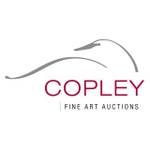The Muller Horner Goose Decoy by Nathan Rowley Horner (1882-1942)
Lot 308
About Seller
Copley Fine Art Auctions
20 Winter Street
Pembroke, MA 02359
United States
Founded in 2005, Copley Fine Art Auctions is a boutique auction house specializing in antique decoys and American, sporting, and wildlife paintings. Over the course of the last two decades, the firm has set auction records for not only individual decoy makers, but also entire carving regions. Copley...Read more
Categories
Estimate:
$6,000 - $9,000
Absentee vs Live bid
Two ways to bid:
- Leave a max absentee bid and the platform will bid on your behalf up to your maximum bid during the live auction.
- Bid live during the auction and your bids will be submitted real-time to the auctioneer.
Bid Increments
| Price | Bid Increment |
|---|---|
| $0 | $50 |
| $1,000 | $100 |
| $2,500 | $250 |
| $5,000 | $500 |
| $10,000 | $1,000 |
| $25,000 | $2,500 |
| $50,000 | $5,000 |
About Auction
By Copley Fine Art Auctions
Feb 24, 2024
Set Reminder
2024-02-24 10:00:00
2024-02-24 10:00:00
America/New_York
Bidsquare
Bidsquare : The Winter Sale 2024, Day 2
https://www.bidsquare.com/auctions/copley/the-winter-sale-2024-day-2-14614
Lots 239-480 Copley Fine Art Auctions cinnie@copleyart.com
Lots 239-480 Copley Fine Art Auctions cinnie@copleyart.com
- Lot Description
The Muller Horner Goose
Nathan Rowley Horner (1882-1942)
West Creek, NJ, c. 1920
24 in. long
"He was much less prolific than Shourds, but his duck, brant, and goose decoys are among the most refined made on the New Jersey shore, with spare, elegant lines and subtly blended paint." — Robert Shaw, "Bird Decoys of North America"
An exceptional Canada goose decoy with schooner-like construction by one of New Jersey’s finest makers. Horner captured the essence of a swimming goose, leaving only that which he felt was necessary to create an impression of the real bird. Perhaps the most forward-reaching Horner Canada goose known, this elegant carving was meticulously hollowed to its featherlight state. The underside is marked with the coveted “ED TOWNSEND” stamp as part of this heralded Horner rig. The underside also bears the Muller Collection and Philadelphia Wildfowl Exposition ink stamps.
Excellent original paint with light gunning wear, a reset neck crack, and touch-up to a chip under bill tip.
Provenance: Ed Townsend Rig, Massachusetts
John Dilworth Collection
Dr. Peter J. Muller Jr. Collection
Private Collection
Literature: Joe Engers, “Dr. Peter J. Muller: Bringing a good eye and an artistic approach to decoy collecting,” Decoy Magazine, January/February 2008, p. 10, exact decoy illustrated. Kenneth L. Gosner, "Working Decoys of the Jersey Coast and Delaware Valley," Cranbury, NJ, 1985, p. 61, exact decoy illustrated (image reversed). Robert Shaw, "Bird Decoys of North America," New York, NY, 2010, p. 187, related example illustrated. Robert Shaw, "Call to the Sky: The Decoy Collection of James M. McCleery, M.D.," Houston, TX, 1992, p. 60, related example illustrated.
Exhibited: Philadelphia, PA, "Philadelphia Wildfowl Exposition," The Academy of Natural Sciences of Philadelphia, 1979.Please email condition report requests to colin@copleyart.com. Any condition statement given is a courtesy to customers, Copley will not be held responsible for any errors or omissions. The absence of a condition statement does not imply that the lot is in perfect condition.Condition
- Shipping Info
-
Shipping info
Copley does not offer in-house packing or shipping. For clients who require shipping, please complete the Shipping Release Form and return it with your payment. The form includes a list of shippers we frequently work with.
-
- Buyer's Premium



 EUR
EUR CAD
CAD AUD
AUD GBP
GBP MXN
MXN HKD
HKD CNY
CNY MYR
MYR SEK
SEK SGD
SGD CHF
CHF THB
THB














